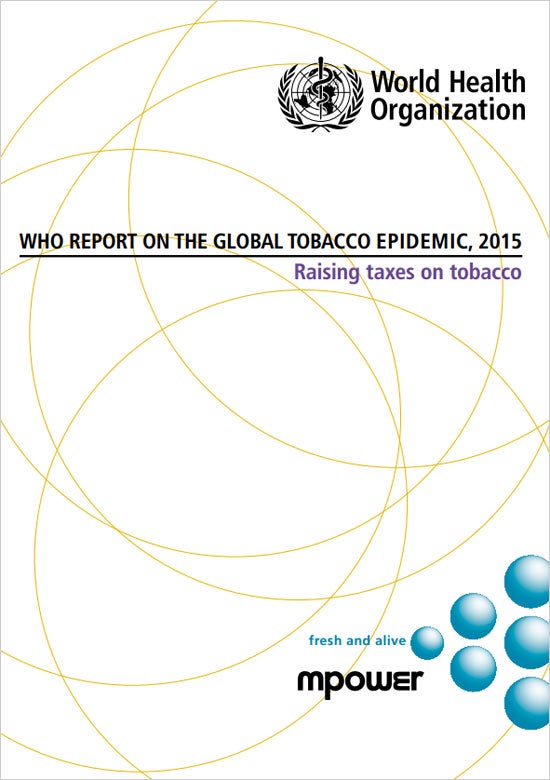 Let’s be clear. Tobacco use, and its negative health, social and economic impact, is not a global problem that is simply going away.
Let’s be clear. Tobacco use, and its negative health, social and economic impact, is not a global problem that is simply going away.
As documented in a recent study, despite significant reductions in the estimated prevalence of daily smoking observed at the global level for both men and women since 1980, the actual number of smokers has increased significantly over the last three decades as the result of population growth. In 2012, it is estimated that close to one billion people were smokers, up from 721 million in 1980.
Clearly, tobacco use is a global epidemic. If we do not want to be passive spectators to the unhindered growth of this threat to global health, then political will at the highest levels of government needs to be galvanized, coupled with sustained support from civil society and international organizations. This is required not only to shine light upon this deadly but entirely preventable threat, but more importantly, to promote effective and sustained action to deal with it.
A new World Health Organization (WHO) report on tobacco taxation, launched today in Manila, raises a troubling question for policymakers across the world: If, as shown by scientific evidence, tobacco is a leading global disease risk factor, why then are so few governments levying appropriate levels of tax on cigarettes and other tobacco products?
The importance of this question is accentuated by the widely accepted fact that raising taxes on tobacco products is one of the most cost-effective measures to reduce consumption of products that kill, while also generating substantial domestic revenue for health and other essential programs—investments that benefit the entire population.
Findings in the report show that while only 33 countries impose taxes that constitute more than 75% of the retail price of a pack of cigarettes—the taxation level recommended to have an impact on consumption —most countries that do tax tobacco products have extremely low tax rates. And some countries do not have a special tax on tobacco products at all.
Given this situation, the WHO report is a much-needed and timely “call to arms.” It encourages governments to look at accumulated country evidence worldwide, and not simply the tobacco industry’s arguments, and to use tax measures to increase the retail price of tobacco products as one of the best available public health policy measures.
The report outlines some important lessons about how to effectively implement this policy measure to achieve the public health objectives of tobacco taxation, based on empirical evidence:
- While nearly all countries tax tobacco products, an excise tax is the most important type of tobacco tax, since it applies uniquely to tobacco products and raise their prices relative to prices for other goods and services.
- Simpler tobacco tax structures are more effective than complex ones, since tiered tax structures are difficult to administer and can undermine the health and revenue impacts of tobacco excise taxes.
- Use of specific excise taxes enhances the impact of tobacco taxation on public health by reducing price gaps between premium and lower-priced alternatives, which limits opportunities for users to switch to less-expensive brands in response to tax increases. Taxing all tobacco products comparably reduces incentives for substitution.
- Ad valorem taxes are difficult to implement and weaken tax policy impact. Since they are levied as a percentage of price, companies have greater opportunities to avoid higher taxes and preserve or grow the size of their market by manufacturing and selling lower-priced brands. This also makes government tax revenues more dependent on industry pricing strategies and increases the uncertainty of the tobacco tax revenue stream.
- Specific excise taxes need to be adjusted for inflation to remain effective.
- Tax increases should reduce the affordability of tobacco products. In many countries, where incomes and purchasing power are growing rapidly, large price increases are required to offset growth in real incomes.
- Strong tax administration is critical to minimize tax avoidance and tax evasion, to ensure that tobacco tax increases lead to higher tobacco product prices and tax revenues, as well as reductions in tobacco use and its negative health consequences.
- Regional agreements on tobacco taxation can be effective in reducing cross-border tax and price differentials and in minimizing opportunities for individual tax avoidance and larger scale illicit trade.
The report also warns countries against accepting the industry’s argument that illicit trade of tobacco products will thrive if taxes on tobacco products are increased. Accumulated evidence shows that this argument is flawed. While high taxes may create incentives for illicit trade, different country experiences show that illicit trade can be controlled by legal means (e.g., use of prominent tax stamps, serial numbers, special package markings, health warning labels in local languages, adoption of uniform tax rates nationwide that facilitate successful collection at the points of manufacture and import) and by increased law enforcement (e.g., improving corporate auditing, better trace and tracking systems, and good governance).
The report makes the point that controls over the distribution chain (from monitoring of production and/or distribution to licensing of all parties involved in manufacturing, distribution and retailing), improved technologies, and better use of data help to reduce illicit trade and complement tobacco tax reforms.
We at the World Bank, working with WHO and other partners, such as the Bill & Melinda Gates Foundation and Bloomberg Foundation, are committed to support countries in the implementation of tobacco taxation measures as outlined in this report. Effective tax regimes that make tobacco products unaffordable represent an important intervention to tackle the growing burden of noncommunicable diseases and a potential important domestic revenue stream for helping finance the UN’s Sustainable Development Goals (SDGs) across the world.
Follow the World Bank health team on Twitter: @WBG_Health
Related:
WHO Report on the Global Tobacco Epidemic, 2015: Raising taxes on tobacco
Full Report
Executive Summary
Press Release
Op-Ed: Taxing Tobacco
Journal of the American Medical Association. “Smoking Prevalence and Cigarette Consumption in 187 Countries, 1980-2012”
Center for Global Development. “The Single Best Health Policy in the World: Tobacco Taxes”
Blog World No Tobacco Day 2015: On illicit trade and taxes
El Pais: Los impuestos al tabaco pueden salvar una vida cada seis segundos
Banco Mundial: Los impuestos al tabaco pueden salvar una vida cada seis segundos


Join the Conversation